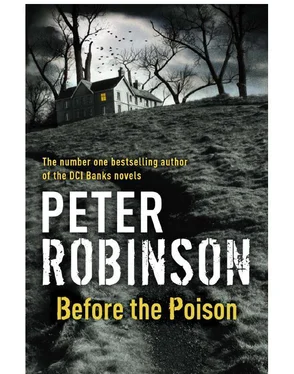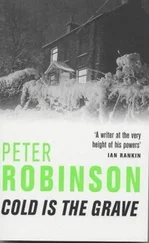Peter Robinson - Before the poison
Здесь есть возможность читать онлайн «Peter Robinson - Before the poison» весь текст электронной книги совершенно бесплатно (целиком полную версию без сокращений). В некоторых случаях можно слушать аудио, скачать через торрент в формате fb2 и присутствует краткое содержание. Жанр: Исторический детектив, на английском языке. Описание произведения, (предисловие) а так же отзывы посетителей доступны на портале библиотеки ЛибКат.
- Название:Before the poison
- Автор:
- Жанр:
- Год:неизвестен
- ISBN:нет данных
- Рейтинг книги:4 / 5. Голосов: 1
-
Избранное:Добавить в избранное
- Отзывы:
-
Ваша оценка:
- 80
- 1
- 2
- 3
- 4
- 5
Before the poison: краткое содержание, описание и аннотация
Предлагаем к чтению аннотацию, описание, краткое содержание или предисловие (зависит от того, что написал сам автор книги «Before the poison»). Если вы не нашли необходимую информацию о книге — напишите в комментариях, мы постараемся отыскать её.
Before the poison — читать онлайн бесплатно полную книгу (весь текст) целиком
Ниже представлен текст книги, разбитый по страницам. Система сохранения места последней прочитанной страницы, позволяет с удобством читать онлайн бесплатно книгу «Before the poison», без необходимости каждый раз заново искать на чём Вы остановились. Поставьте закладку, и сможете в любой момент перейти на страницу, на которой закончили чтение.
Интервал:
Закладка:
February 2011
Kilnsgate House was waiting for me like an old friend when I got out of the taxi I’d taken from Darlington railway station. A pile of mail awaited me inside, scattered over the floor below the letterbox. It was mostly bills and junk. Nobody writes letters any more in these days of emails and texts. I wondered whether the collected emails of John Keats would have been half as interesting as his letters. I doubted it. The medium does make a difference.
I dumped my bag in the hall, turned up the central heating and went into the kitchen to make a cup of tea. It was late afternoon, and I had been awake all night on the plane from Cape Town and spent most of the day getting home from Heathrow, my patience with the train system definitely wearing thin. There was no excuse. It hadn’t even been snowing.
I had spent my last day in Cape Town wandering the waterfront cafes and shops. I had bought a wrap-around summer dress of beautiful patterned material at the market for Heather. I didn’t know whether it was the kind of thing she would wear or not, but at least she might appreciate the design and the African colours and use it as a wall hanging. I thought she would look good in it, at any rate. I had also bought a few CDs of local musicians for myself – Judith Sephuma, Abdullah Ibrahim, Wanda Baloyi, Pops Mohamed – finding that the record shop I had discovered on my previous visit was still thriving.
When my tea was ready, I carried it through to the living-dining room and sat by the fire. I would probably light it later. It was early February, and the snow had all gone, but that all-permeating Yorkshire chill was in the air, making it seem colder, especially after the South African sun. The temperature outside was six degrees Celsius, and the sky was grey and threatening rain. The woods beyond my back garden seemed dreary and forbidding. I put some Abdullah Ibrahim jazz piano on, then settled in my comfortable armchair to sort out the post. As I had thought, it turned out to be bills and circulars. The only letter of any interest was an invitation to speak at a film festival at London’s South Bank Centre in May. I decided I would probably go. It could be fun.
Next I checked the messages on my phone. There were two sales calls – BT and double-glazing – and a welcome-home message from Heather. She said to give her a ring. I checked my watch. It was ten to four and already getting dark. I was too tired for company tonight, too tired for anything, really, except a final bit of research I needed to do online.
There was also a message from Mother, asking me in her inimitable way whether I was still alive. I immediately felt guilty. With all the excitement of finding Louise and then Billy Strang, I had forgotten about Mother. I rang back and listened to her complain about the weather for about fifteen minutes, then promised to come and visit her as soon as I could, and hung up.
Next I phoned Heather, and we agreed to meet in a couple of days, when I had caught up on my sleep. Next, I had a couple of important phone calls to make. I had had plenty of time since my afternoon with Billy Strang to think things over, and I believed that after all my floundering around in the dark I now knew the truth about what happened on that first of January 1953, here at Kilnsgate. Louise King and Samuel Porter deserved to know before anyone else, so I picked up the phone.
The following morning, still dragging my feet a little, I carried a spade up the hill to the lime kiln and surveyed the tangled mess of weeds inside. I attempted a couple of thrusts, but soon realised it was no good; I couldn’t do this by myself. I didn’t feel confident enough to call in the authorities at this stage, but there was only one way to find out whether I was right, and that was to dig.
I went back to the house and phoned Tony Brotherton. When I explained my theory, he clearly thought I was crazy, but I reminded him of his grandfather’s concerns, and in less than half an hour he arrived with Jill and two strong farm labourers.
Feeling useless, I stood by, leaned on a tree and watched them work. Though it was a chilly February morning, they soon broke sweat as the pile of sod and earth grew beside the kiln. I had no idea how far down they would have to dig, and it was almost an hour later when Jill bent over and said, ‘Good Lord, Chris. You’d better come over here and have a look at this.’
I walked over, and my gaze followed her pointing finger. There, in the bed of soil, was what looked like the skeleton of a human hand. I had no idea of anatomy, of course, and I will admit it could easily have been from a cow or a sheep, but as Jill carefully brushed away the rest of the clinging soil, the form slowly took shape, and by the time she had done the best she could, there was not one of us standing there who was not convinced that we were looking at a human skeleton.
I had just put the lasagne in the oven when Heather arrived for dinner two days later. Across from Kilnsgate, the lime kiln was still mysteriously screened off by canvas, though it was deserted at the moment. After our grim discovery, I had called the police, of course, and they had removed the remains for forensic examination. Their preliminary findings, communicated to me that afternoon by the detective assigned to the case, had borne out my suspicions, but had not determined the cause of death. Perhaps that was too much to ask after all this time.
I had planned a simple meal, entirely home made, accompanied by a Caesar salad – a genuine one, not the kind they serve with cucumber and tomatoes at the local Italian restaurant – topped off by a dish of fruit and a plate of local cheeses from Ken Warne’s.
Heather looked as lovely as ever, dressed simply in black tights and a roll-neck rust-coloured dress that came to just above her knees, her hair tied back with a green ribbon at the nape of her neck.
‘My God,’ she said as I led her through to the living room. ‘You’ve got a suntan and you were only away three days.’
‘I tan quickly,’ I said. Nobody ever noticed in LA. I had, however, developed a distinct Yorkshire pallor since I had been over here, and the tan wouldn’t last long. I gave Heather the dress I had bought her, and she made excited sounds about the colours and the pattern, wrapping it around herself, trying to figure out how she could wear it decently. ‘Maybe we can try a few variations later,’ I suggested.
By the fire, which I had lit before preparing dinner, I poured us each a glass of wine, and we sat down. ‘From what you told me on the phone there’s been more than a little excitement around here,’ Heather said.
‘You could say that.’
‘It all sounds rather gruesome. Bodies in the lime kiln.’
‘One body,’ I said. ‘And it was a skeleton.’
‘Even so.’ She gave a little shiver. ‘To think it’s been out there all that time.’
‘Since 1941 or 1942, to be exact,’ I said. ‘Nat Bunting.’
‘But how do they know?’
‘He had a club foot. It shows on the skeleton.’
‘And what happened to him?’
‘That we don’t know.’
‘What do you think?’
‘I have plenty of theories, but I can’t be certain. At first I thought it was because he might have seen something, found out too much. Tony Brotherton’s grandfather saw Nat inside the wired-off compound at Kilnsgate during the war.’
‘You only thought that at first?’
‘Nat was… challenged,’ I said. ‘He wouldn’t have known it if he had seen something he wasn’t supposed to see.’
‘But they probably didn’t know that.’
‘Ernest Fox did.’
‘So, what, then?’
‘I know it sounds far fetched, but I think he may have died as a result of the experiments they were doing there at Kilnsgate, most likely infected by accident. I did a bit of research, and not much of it is public, but what we do know is that in the Second World War the Porton Down people were doing a lot of experiments with biological weapons. Not so long ago, some War Cabinet committee files were released to the National Archive, and it turns out that they were particularly interested in bacteriological diseases such as typhoid, dysentery and cholera in humans, and anthrax, swine fever and foot-and-mouth in animals.’
Читать дальшеИнтервал:
Закладка:
Похожие книги на «Before the poison»
Представляем Вашему вниманию похожие книги на «Before the poison» списком для выбора. Мы отобрали схожую по названию и смыслу литературу в надежде предоставить читателям больше вариантов отыскать новые, интересные, ещё непрочитанные произведения.
Обсуждение, отзывы о книге «Before the poison» и просто собственные мнения читателей. Оставьте ваши комментарии, напишите, что Вы думаете о произведении, его смысле или главных героях. Укажите что конкретно понравилось, а что нет, и почему Вы так считаете.












